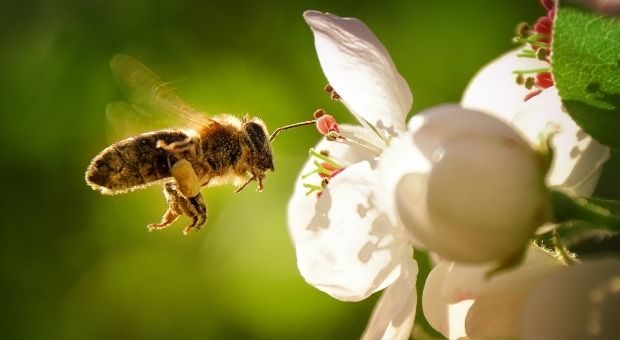03
Mar
Massachusetts Regulators Restrict Consumer Use of Bee-Toxic Neonicotinoid Pesticides

(Beyond Pesticides, March 3, 2021) Earlier this week, pesticide regulators in the commonwealth of Massachusetts voted to restrict outdoor consumer uses of neonicotinoid insecticides. The move is the result of sustained advocacy from broad coalition of individuals and organizations focused on protecting pollinators and ecosystem health. While advocates are pleased that the Pesticide Board Subcommittee made Massachusetts the first state in the country to restrict neonicotinoids through a regulatory process, they note this is only the first step in eliminating these hazardous insecticides.
“This marks an incremental victory which took us 6 years to land, and it only happened because of immense, ongoing grassroots action and legislative allies who are willing to hold state regulators accountable,” said Martin Dagoberto, Policy Director of the Northeast Organic Farming Association, Mass. Chapter in a press release. “We still have a monumental endeavor ahead if we are to reduce toxins and rein in the toxic influence of the chemical lobby,” Mr. Dagoberto added.
Advocates had been pushing the legislature to pass An Act to protect Massachusetts Pollinators, sponsored by pollinator champion Representative Carolyn Dykema, since 2014. Following several failures by state lawmakers to bring the bill over the finish line, efforts in 2019 resulted in a literature review on the impacts of neonicotinoids on pollinators. The literature review found the vast majority of studies showing neonicotinoids contributing to pollinator declines. It noted that the only studies minimizing pollinator impacts are those conducted by the pesticide industry, and that “the author’s analyses relied heavily on unpublished reports published by these manufacturers, which limits third-party review of the underlying studies.”
Despite years of advocacy and education, and a legislature-commissioned literature review showing clear danger from neonicotinoid use, Massachusetts lawmakers again failed to pass Representative Dykema’s bill during the 2020 session. As a result, efforts turned towards the Massachusetts Pesticide Board Subcommittee, the regulatory body within the commonwealth tasked with registering or restricting pesticide use.
A hearing late last year saw over 100 supporters show up to provide testimony over zoom. Fifty-five agricultural, environmental, climate and pollinator advocacy organizations delivered a letter to state regulators, and 80 Massachusetts lawmakers called on the subcommittee to act to restrict neonicotinoids. In a blistering critique on their work to date, the lawmakers noted, “Despite concerns about neonicotinoids being brought to the Department’s attention repeatedly by the Attorney General’s office, legislators and others since 2014,the Subcommittee failed to initiate an independent review or take any consequential action until 2019, when legislatively required to do so. This inability or unwillingness to respond to concerns that clearly fall within its purview raises concerns about whether the Subcommittee is able to fulfill its charge under the law to regulate pesticides.”
At the next meeting of the Subcommittee, the following motion was introduced:
That the Pesticide Board Subcommittee has determined that current uses of neonicotinoid pesticides used in outdoor non-structural uses or outdoor non-agricultural uses, may pose unreasonable adverse effects to the environment as well as pollinators, when taking into account the economic, social and environmental costs and benefits of their use in the Commonwealth. Therefore, the Subcommittee modifies the registration classification of pesticide products containing neonicotinoids that have outdoor non-structural uses or outdoor non-agricultural uses on the label from general use to state restricted use. These include but are not limited to, uses on lawn and turf, trees and shrubs, ornamentals, and vegetable and flower gardens. The reclassification shall begin on July 1, 2022.
This motion, finalized and passed earlier this week, makes all neonicotinoid pesticides labeled for outdoor, non-structural (e.g., termites), nonagricultural uses restricted use in Massachusetts and only available to licensed pesticide applicators. Homeowners and other consumers in Massachusetts without a pesticide license will not be able to purchase or apply these pesticides to their outdoor properties under these restrictions.
Advocates note that this action is weaker than Rep. Dykema’s Act to Protect Massachusetts Pollinators, as it lacks a requirement to provide consumers information on the dangers of neonicotinoids that could lead them to opting out of any neonicotinoid application to their property. The previous Act also called on regulators to update educational information about the risks neonicotinoids pose to pollinator populations.
Massachusetts now joins Maryland, Connecticut, and Vermont in restricting consumer uses of these hazardous insecticides. But it is evident that these victories must only be the first step toward broader protections for pollinator populations.
While regulators in both Canada and the European Union have eliminated nearly all uses of neonicotinoids, the U.S. Environmental Protection Agency has done little but shuffle around language on a pesticide label. In one of its oddest proposals yet, the agency suggests reregistering the sort of consumer use products targeted by the state proposals, but require, “language on the label that advises homeowners not to use neonicotinoid product.” Thus, EPA knows the science agrees with the restrictions states have been imposing, but is unwilling to take the regulatory actions needed to protect all pollinators across the country.
Neonicotinoids and other systemic bee-toxic pesticides pose unacceptable hazards to pollinators that necessitate complete elimination of their use. Not only are these chemicals ultimately ineffective at managing pests, organic and sustainable farming practices show these products can be replaced with organic practices that foster greater resiliency to pest pressure. Read more about the harms bee-toxic pesticides pose to pollinators and actions you can take in your state and community on Beyond Pesticides Bee Protective webpage.
All unattributed positions and opinions in this piece are those of Beyond Pesticides.










